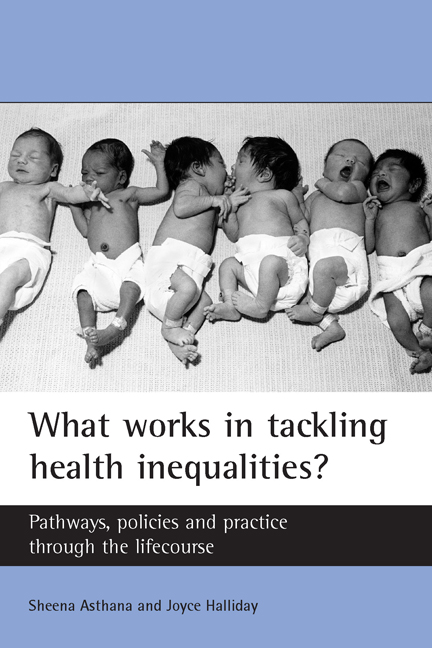Book contents
- Frontmatter
- Dedication
- Contents
- List of tables, boxes and figure
- Acknowledgements
- List of abbreviations
- one Introduction
- Part 1 The research and policy context of health inequalities
- Part 2 Health inequalities pathways, policies and practice through the lifecourse
- Part 3 Tackling health inequalities: developing an evidence base for public health
- Index
Part 3 - Tackling health inequalities: developing an evidence base for public health
Published online by Cambridge University Press: 14 January 2022
- Frontmatter
- Dedication
- Contents
- List of tables, boxes and figure
- Acknowledgements
- List of abbreviations
- one Introduction
- Part 1 The research and policy context of health inequalities
- Part 2 Health inequalities pathways, policies and practice through the lifecourse
- Part 3 Tackling health inequalities: developing an evidence base for public health
- Index
Summary
It is important that policies designed to address health inequalities are based on reliable evidence. Throughout the course of this book we have examined evidence on the effectiveness of intervention activities targeting a wide range of pathways and processes that give rise to health inequalities across different stages of the lifecourse. To this end, we have drawn on a variety of evidence, supplementing review-level findings with other published literature and grey literature. According to the formal evidence base, remarkably little actually ‘works’. By contrast, the ‘view from the ground’ suggests that local interventions can make a difference to health inequalities. This produces quite a dilemma for local policy makers and practitioners who are encouraged to draw on the highest-quality evidence in formulating local policies and projects. Experience and local knowledge may tell them one thing, but the formal evidence base another. There is growing concern among public health researchers and policy makers that this says more about the methods used in the field of evidence-based public health than the potential effectiveness of public health interventions themselves.
Chapter Fourteen begins by exploring the growing critique of the narrow, hierarchical approach to evidence in public health which continues to be dominated by the systematic review. It finds a number of limitations of this approach, including the questionable relevance of results yielded in controlled, scientific and well-resourced conditions to routine service delivery; the lack of evidence that has been forthcoming about the cost-effectiveness of public health and preventative policies; the lack of information about process, affecting ability to distinguish between evaluation failure and programme failure and between the contributions of different programme elements; and the lack of evaluation focusing on what works for particular socio-economic or vulnerable groups. There has, moreover, been a bias towards interventions with a medical rather than a social focus, and those that target individuals rather than communities or populations; an overwhelming focus on publication in English, mitigating against international comparison; and a failure to control adequately for context, undermining the extent to which the current evidence base offers lessons that are either practically applicable or transferable.
Such concerns have given rise to a search for alternative strategies.
- Type
- Chapter
- Information
- What Works in Tackling Health Inequalities?Pathways, Policies and Practice through the Lifecourse, pp. 561 - 564Publisher: Bristol University PressPrint publication year: 2006



